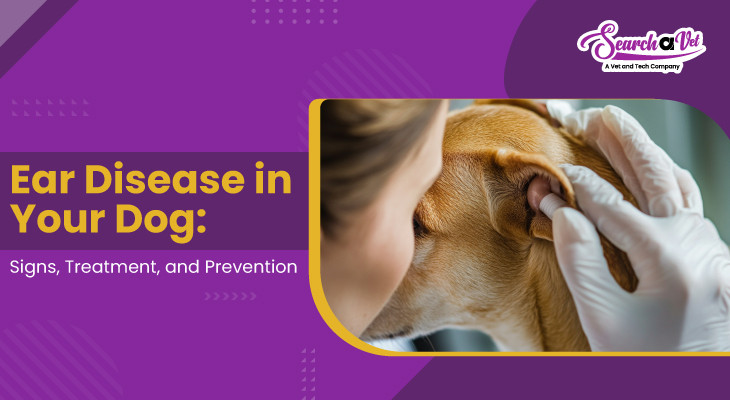Ear Disease in Your Dog: Signs, Treatment, and Prevention
 Oct 02, 2024
Oct 02, 2024

Dogs rely on their ears for far more than only hearing. Ears enable their communication and balance-keeping. Sadly, a major problem many dog owners deal with is ear disease. It may cause significant pain and maybe permanent harm if not addressed.
Whether you have an elderly dog or a puppy, knowing the potential symptoms of ear illness and how to look after their ears is essential. Early diagnosis and appropriate veterinarian treatment can improve your dog's overall well-being.
This blog will discuss the common causes, symptoms, and remedies of ear disease in your dogs. You will also learn about preventative steps to maintain the health of the ears of your beloved pet.
What Causes Ear Disease in Your Dogs?
Here are some common reasons that disturb your dog's normal life with so many complications and demand quick veterinary care to relieve the issue.
Infections
Prime agents that contribute are bacteria, yeast, and fungus. These germs might flourish if your dog's ears remain damp or unclean.
Allergies
Dogs allergic to something are more prone to have ear issues. Inflammation can result from allergens like pollen, dust, and some foods.
Ear Mites
Tiny parasites can cause significant itching and irritation in your dog's ears.
Foreign objects
Your dog's ear canal might get trapped with grass seeds, dirt, or other things, causing an infection.
High quantity wax buildup
An accumulation of earwax can obstruct the ear canal and retain moisture, fostering an environment where germs could flourish.
*Important to consider: You can actively prevent the problem after knowing the exact source that can cause the issue and then go for detailed veterinary care.
Types of Ear Diseases in Dogs
1. Otitis Externa (Outer Ear Infection)
It is a common ear disease in your dogs, which is quite painful and mainly affects the outer ear canal. This condition can range from mild to severe, often causing your dog to feel discomfort and itchiness.
Symptoms:
- Appear as redness or swelling around the ear canal
- Repeated scratching or pawing at the ears
- Unpleasant odor from the ear
- Yellow or brown discharge
- Sensitivity when touching the ears
Causes:
- Different types of allergies
- Bacterial or yeast infections
- Ear mites
- Excessive moisture from swimming or bathing
Treatment:
- Cleaning the ears regularly to remove debris
- Topical ointments to reduce inflammation
- Use veterinarian-prescribed antibiotics or antifungal medication
- Managing underlying allergies
- Avoiding water in the ears during baths or swimming
2. Otitis Media (Middle Ear Infection)
When the infection penetrates farther into the middle ear, otitis media develops. It may impair your dog's hearing and balance and be more serious than otitis externa. Prompt diagnosis and treatment are essential to avert permanent harm.
Symptoms:
- Head tilting or shaking
- Loss of balance or coordination
- Reluctance to chew or open the mouth
- Pain when yawning or moving the jaw
Causes:
- Untreated outer ear infections
- Trauma or injury to the ear
- Tumors or polyps in the ear canal
- Bacteria traveling through the bloodstream
Treatment:
- Oral antibiotics or antifungal medications
- Ear flushes to remove debris and infection
- Pain management to keep your dog comfortable
- Surgery in severe cases
- Use vet-approved animal health solutions for dog ear
3. Ear Mites (Parasitic Infection)
Microscopic parasites (ear mites) inhabit the ear canal and are responsible for severe itching. Easily transmitted from one pet to another, they are highly infectious.
Puppies and young dogs are particularly prone to this disease.
Symptoms of ear disease in your dog:
- Persistent scratching or rubbing of the ears
- Coffee ground-like debris inside the ear
- Inflammation and redness
- Scabs around the ears
Causes:
- Contact with infected animals
- Poor hygiene in the living area
- Weak immune system
- Sharing bedding or grooming tools with infected pets
Treatment:
- Prescription ear drops to kill the mites
- Cleaning the ears to remove debris
- Treating all pets in the household to prevent reinfection
- Topical or oral anti-parasitic medications
- Regular dog care and ear checks until the infection fully recovers
4. Chronic Ear Infections
Some dogs suffer from chronic ear infections due to underlying conditions like allergies or structural abnormalities. Chronic diseases can lead to long-term discomfort and even permanent ear damage if not appropriately managed.
Symptoms:
- Frequent ear infections, even after treatment
- Thickening or narrowing of the ear canal
- Constant ear discharge
- Strong, unpleasant odor
- Scarring inside the ear
Causes:
- Different allergies
- Poor ear structure, especially in floppy-eared breeds
- Long-term moisture trapped in the ear
- Fungal or bacterial infections that persist
Treatment:
- Identifying and managing underlying allergies
- Regular ear cleaning
- Long-term use of medicated ear drops
- Anti-inflammatory medications to reduce swelling
- Surgery in severe cases to widen the ear canal
5. End-Stage Ear Disease
The end-stage ear disease in dogs occurs when chronic ear infections are left untreated, causing irreversible damage to the ear structures. This serious ear disease in your dog may require surgical intervention.
Symptoms:
- Severe pain and discomfort
- Total hearing loss in the affected ear
- Thickened, scarred ear tissue
- Abscesses or open sores inside the ear
- Head shaking and tilting that does not improve
Causes:
- Chronic, untreated ear infections
- Long-term allergies that affect ear health
- Untreated ear mites or parasites
- Continuous exposure to moisture or dirt in the ear
- Lack of routine veterinary dog care
Treatment:
- Surgery (TECA) to remove damaged tissue
- Pain management for ongoing comfort
- Preventive care to avoid infection in the remaining ear
- Post-surgery recovery with regular vet check-ups
- Careful monitoring of ear health post-treatment
How to Prevent Ear Disease in Your Dogs
Regular Ear Cleaning
- Use a vet-recommended ear-cleaning solution
- Gently wipe the outer ear canal with a soft cloth or cotton ball
- Avoid inserting objects deep into the ear canal
- Clean once a week or as advised by your vet
Keep Ears Dry
- Dry your dog’s ears thoroughly after swimming or bathing
- Use a dry cloth or cotton ball to remove excess moisture
- Ensure the ear canal is dry to prevent bacterial or yeast growth
Routine Vet Check-Ups
- Schedule regular veterinary exams to check ear health
- Have your vet inspect and clean your dog’s ears if needed
- Address any early signs of ear problems promptly
Manage Allergies
- Identify and manage allergies that may affect ear health
- Discuss allergy treatments with your vet
- Regularly check for signs of allergic reactions affecting the ears
Avoid Foreign Objects
- Prevent your dog from sticking their head in bushes or dirt
- Regularly check and remove any debris from the ears
- Ensure your dog’s living area is clean and free of potential ear irritants
Treat Ear Infections Promptly
- Seek veterinary care if you notice symptoms of an ear infection
- Follow the vet’s treatment plan thoroughly
- Avoid using over-the-counter medications without vet approval
Proper Diet and Hygiene
- Feed your dog a balanced diet
- Maintain good hygiene to prevent infections
- Ensure your dog’s bedding and living area are clean
Consult your vet at the first sign of trouble to ensure the best outcome for your pet.
To Sum Up
Ear disease in your dogs can range from mild to severe, and early detection is key to preventing long-term damage. Regular ear checks, routine cleanings, and swift treatment of infections can help keep your dog’s ears healthy.
Search a Vet help you provide reliable care to your pet it deserves.
We connect you to top veterinarians or animal hospitals to get online appointments and consultations in a single platform to address potential ear diseases.
We aim to bridge the gap between pet parents and animal health care professionals to make pet health more accessible.
FAQs
What should I do if my dog keeps getting ear infections?
If your dog often suffers from ear infections:
- Ensure regular ear cleaning (Use vet-approved solution if possible)
- Keep your dog’s ears dry (especially after bathing)
- Manage underlying allergies with your vet’s guidance
- Schedule regular vet check-ups
- Monitor contributing environmental factors
What is end-stage ear disease in your dogs?
Dogs with long-standing ear infections may develop an irreversible ear canal disease. Due to chronic inflammation, the ear canal thickens and can turn into bone. As a result, the infection will not resolve with medications.




